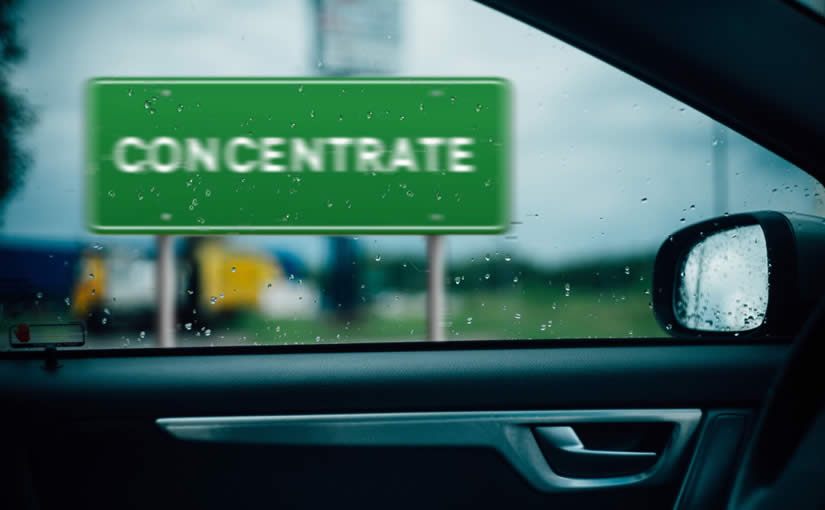To drive safely and to properly plan ahead, it’s important to concentrate at all times when driving. Around 42 percent of accidents occur due to the driver not concentrating. A lack of concentration can occur if you’re:
- Feeling unwell
- Feeling tired
- Feeling emotional
- Under considerable stress
- Distracted
It’s important that you are self-aware and avoid driving if you think any of those issues may affect your concentration.
Feeling Unwell
If you’re feeling unwell, it can affect your driving and concentration. Reaction time is also affected and can slow down by up to 50 percent. If you’re not feeling well, always consider how safe it is to drive.
Feeling Tired
We all feel tired at times but don’t often consider how it might affect our driving. If you’re tired and driving (driver fatigue), your concentration and attention will be significantly reduced. In fact, around 20 percent of accidents relate to driver fatigue.
Driving While Emotional
If you’re feeling particularly angry or sad, you can expect that this might detract from your ability to drive. In fact, studies have shown that drivers displaying strong emotions have reduced concentration and reaction times similar to a drunk driver. Further, strong positive emotions are equally as hazardous as negative emotions.
Stress Driving
Stress is a part of all of our lives and it affects us all differently. Stress triggers negative emotions and as such, affects our ability to drive. This becomes more apparent if you’re under considerable stress.
Distractions Affect Concentration
Distracted driving is one of the leading causes of a loss of concentration, particularly among young drivers. The most common forms of distraction are as follows.
Sat-Navs
In-vehicle technology such as satellite navigation systems (sat-nav), though often beneficial can be a cause of distraction. If you intend on using the sat-nav, either set the destination before you set out or if already driving, find a safe and legal place to stop to input a destination or to make adjustments. Only look at the sat-nav screen very briefly before reverting your attention back to the road.
In-Car Entertainment Systems and Music
In-car entertainment systems can affect concentration. Tuning the radio, looking for and changing a CD and using MP3 players can take your attention away from the road. It only takes a moment for an accident to happen, so wait until you’ve stopped.
To fully concentrate when driving, we need to hear what’s going on around us. For example, we might be able to hear a motorcycle passing or an approaching emergency vehicle that we might otherwise not see. Avoid loud music or using headphones as this can mask sounds around us.
Hand-Held Phones
Other than for making a genuine emergency 999 call, it is illegal to use a hand-held mobile phone when driving and if caught, you’re likely to receive 6 penalty points and a £200 fine. If you’ve passed your test within two years, it also means you’ll lose your licence. Drivers that use a hand-held phone cause hundreds of accidents each year, some of which result in fatalities. Statistically, you’re four more times likely to crash your car if you’re using a mobile phone.
To avoid being distracted by your phone, switch it off or put it on silent mode and put it out of reach before setting off. By doing this, you’ll avoid temptation to use it. Though it’s legal to use a hands-free phone, it still results in distraction. It’s much safer to not use any phone while driving.
Passengers
Passengers can be a significant source of distraction, especially to young drivers. Young drivers carrying passengers get distracted by talking and passengers using a mobile phone.
